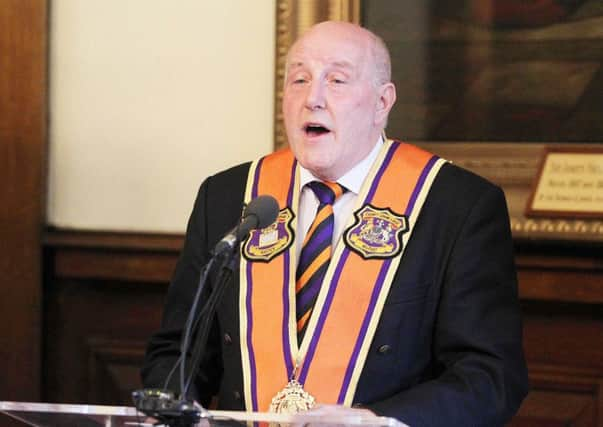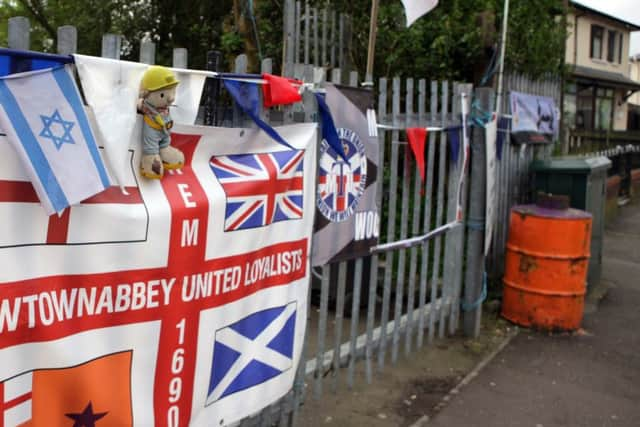Senior Orangeman outlines '˜simple resolution' to disputed parade row


Belfast Deputy Grand Master Spencer Beattie said he was optimistic the disputed parade at the centre of the row could be facilitated before the height of this summer’s loyal order marching season - a move, he insisted, that would end the 24/7 protest presence on the Woodvale/Ardoyne sectarian interface.
On the other side of the debate, parish priest in Ardoyne Father Gary Donegan claimed the “moderate voice” of nationalism in the area was prepared to countenance compromise.
Advertisement
Hide AdAdvertisement
Hide AdA “civil rights” camp to some, an illegal eyesore to others, the site occupied by loyalist protesters on Twaddell Avenue has remained longer than most observers predicted. The numbers manning it have steadily dwindled over the years, but a rump remain.


The cost of the three-year policing operation required to monitor their nightly protests is approaching £20 million.
The camp was established in 2013, when the Parades Commission - a government-appointed adjudication panel for controversial marches - prevented Orangemen passing the nationalist Ardoyne along a contentious stretch of the Crumlin Road as they returned from traditional Twelfth of July commemorations.
Similar restrictions have been put on parades in the years since, with rioting in the area in 2015, but the primary objective of the camp is allowing the three Orange lodges stopped in 2013 to complete their homeward journey.
Advertisement
Hide AdAdvertisement
Hide AdMr Beattie said if that happened, the camp would go and the focus could be shifted to finding a more permanent resolution to the annual dispute.


Commenting ahead of a major parade on Thursday evening to mark the 1,000 day landmark, the senior Orangeman said: “The resolution to our mind has always been simply, it still remains simple - toleration of the six minute parade up the road completes the journey and takes away the problem and takes away the protest.”
He added: “If the lodges were allowed to return home, the dynamic changes and the obstacle is removed, the playing field levels and therefore more constructive conversations could be had.
“If the parade is allowed home I stand ready, as soon as that parade is up the road, to go into any form of conversation that is necessary to seek a long-term solution to the problem.
Advertisement
Hide AdAdvertisement
Hide Ad“I always like to look to a positive and I always try to think there will be a resolution sooner rather than later.”
He added: “We would hope the parade would be allowed up the road long before July 2016.”
Contacts between protagonists on both sides of the wrangle continue in the background.
The chances of resolution are complicated by the presence of two separate residents’ group in the Ardoyne, one of them with a more hard-line stance than the other.
Advertisement
Hide AdAdvertisement
Hide AdFr Donegan said he felt the position “most representative” of the area was focused on finding a solution.
He said any agreement could not be a “stop gap or plaster over an open wound”.
“Let’s actually make this once and for all a situation where, okay, it isn’t perfect for everybody, everybody is going to have to take a hit on this, everybody is going to have to swallow hard but, at the end of the day, it’s for the future of our society and the future of the children of both of those communities,” he said.
The priest at Holy Cross church insisted any accommodation had to be struck at a local level.
Advertisement
Hide AdAdvertisement
Hide Ad“You get all sorts of well-meaning people come up with hare-brained ideas as to how to solve these things, but they haven’t lived a single night here,” he said.
The cleric said the nationalist community had come to almost ignore the sight of the camp, as it had not any real impact on their everyday life.
But he said he regretted the cost of policing it.
“When you are based in an area of social deprivation you realise what £20 million, what £10 million could have done in both communities,” he said.
“What you could do for kids in the area if you had spent that kind of money on them and developing the area.”